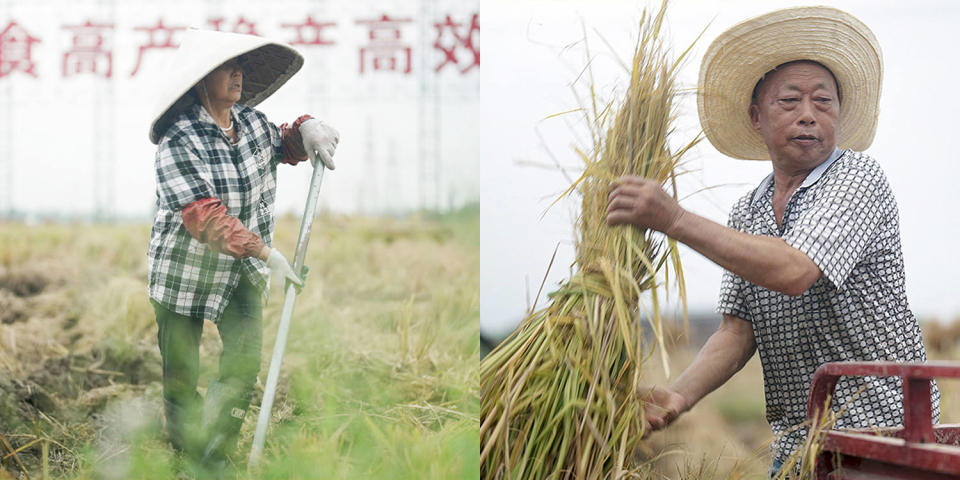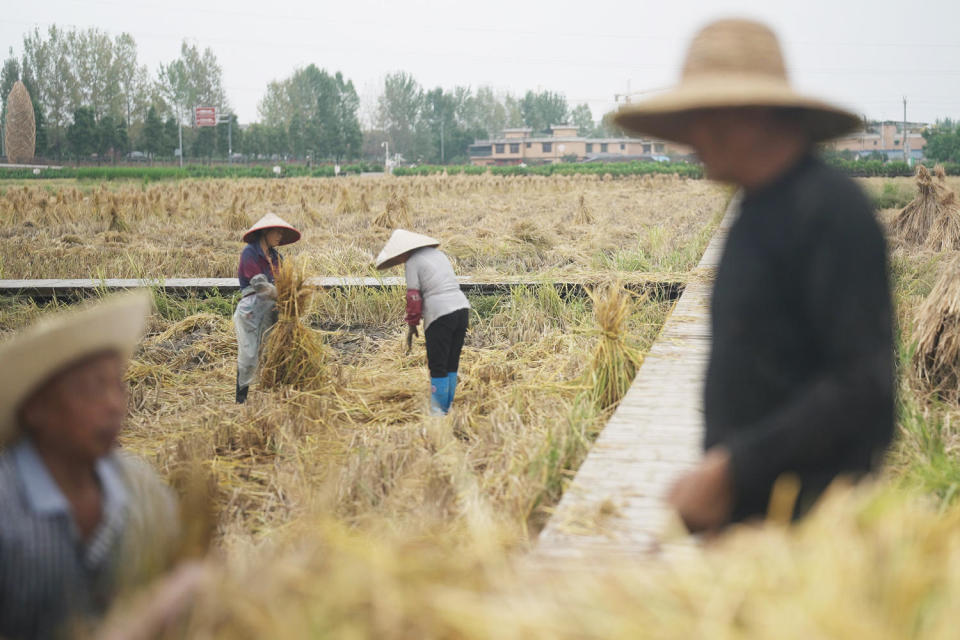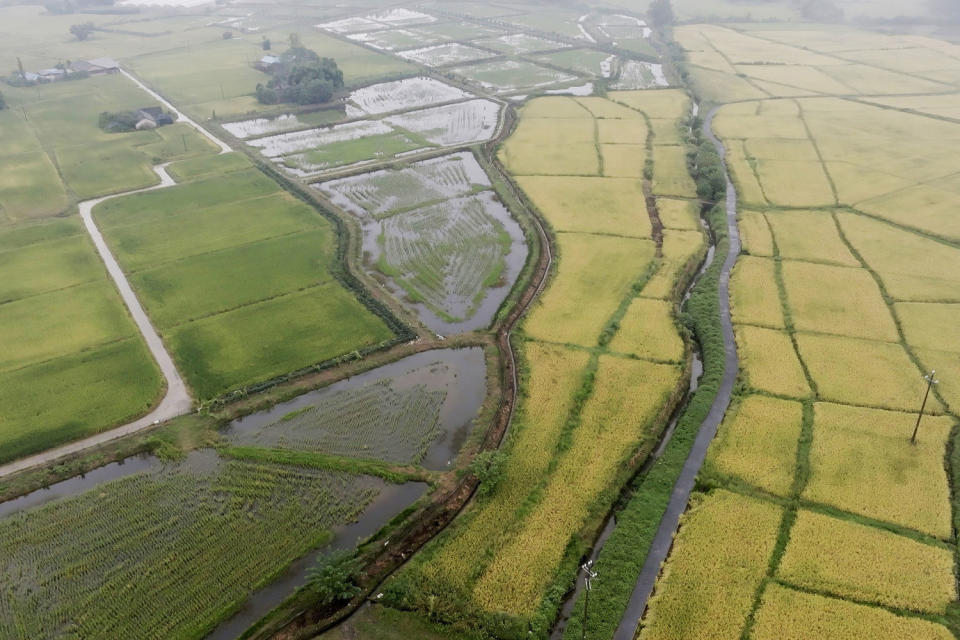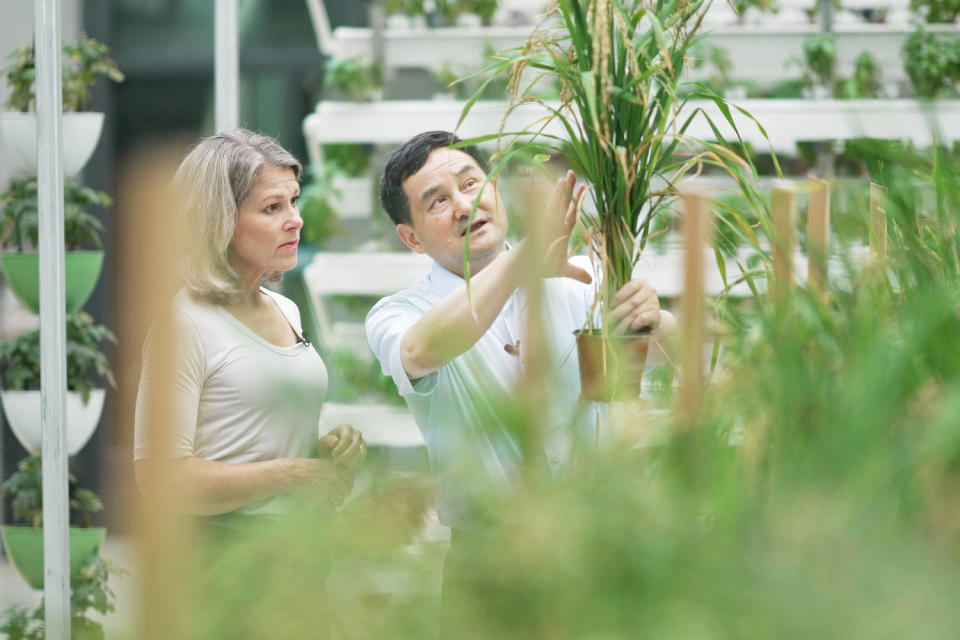Extreme weather and war in Ukraine bring food security into sharp focus in China
- Oops!Something went wrong.Please try again later.
CHENGDU, China — As the green and yellow crops swayed around her, the farmer provided a small insight into China’s efforts to feed its 1.4 billion people.
“It’s all rice,” the woman surnamed Liu, 60, told NBC News last month. “Even in the local graveyard.”
Left reeling from a summer of record flooding after some of the heaviest rainfall in 140 years, destroying harvests and leaving millions of tons of grain lost — all amid heightened tensions with the West and the war in Ukraine — China’s leaders have been ramping up efforts to shore up the supply of food and lessen dependence on imports.

“Food security is very important to China,” said Tim Benton, a professor at the University of Leeds in England and the director of the Environment and Society Center at Chatham House, a London-based think tank.
“Over the last 20 or 30 years the requirements for large-scale urban populations eating more ultra-processed food and a greater range of food means that their self-sufficiency ratio, in terms of how can they feed themselves, has dropped from a percentage in the high 90s to about 66%,” he said.
Benton added that President Xi Jinping and other leading figures in the ruling Chinese Communist Party would remember growing up during the Great Leap Forward, a disastrous attempt in the late 1950s and early 1960s by then-leader Mao Zedong to rapidly industrialize Chinese society that led to millions of deaths from starvation and the brutal purges of the 1966-1976 Cultural Revolution.
As a result, Benton said, there is a recognition that in a “very authoritarian state, the ability to keep everybody happy ultimately rests on food security.” If there were to be another significant famine, he said, “the center of the party would feel at risk.”
More recently, he said, the war in Ukraine, tensions with the West and extreme weather have reinforced “this basic issue that they are frightened of food insecurity and they don’t want to rely on the market.”

He added that it had been “interesting to see the use of food as a weapon of war” by Russian President Vladimir Putin’s government, which has blocked Ukrainian grain exports, and that “a country like China is very nervous about being held to ransom.”
In its bid to seek greater self-sufficiency for a fifth of the world’s population with less than 10% of the world’s arable farmland, the Chinese government is expanding areas for planting and has already reclaimed nearly half a million acres nationwide to grow more staple foods like rice, soybeans and wheat. But most of the country’s farming regions are under the monsoon influence, making them susceptible to floods and drought.
Flooding in July in Chongqing, a metropolis in China’s southwest, prompted the country’s highest emergency alert as it killed at least 15 people, affected more than 13,000 others and damaged tens of thousands of acres of crops, including rice and corn.
Further north, high temperatures compromised the quality and quantity of crops in other parts of the country, prompting farmers to warn that the situation is getting worse as extreme weather events occur more often.
So Beijing has started to focus on food technology.

At the Institute of Urban Agriculture in Chengdu, the capital of Sichuan province, professor Yang Qichang said that indoor vertical farming had allowed them to “achieve year-round growth” of wheat in an artificial environment.
“The growth cycle of wheat usually takes 120 to 150 days,” he said. “Now the wheat in the breeding base can be harvested in about 55 to 65 days, which means the growth cycle is shorter.”
He added that this meant there was the potential for five or six harvests a year instead of one or two.
Already the world’s biggest food producer, China is also the biggest food importer. The country imported more than 140 million tons of grains last year, the equivalent of 21% of its annual domestic grain production.
Amid tensions with the U.S., which was its biggest agricultural supplier before a trade war began in 2018, Beijing has turned to countries such as Brazil and Argentina for food imports, while ramping up efforts to ensure food security and carrying out a high-profile campaign against food waste.

“We cannot control the environment in an open field,” Yang said, adding that indoor growers could control the temperature, humidity and carbon dioxide, as well as plant nutrient systems.
“Inside there is no drought, there is no flood. There are no extreme weather patterns to worry about,” he said.
“Because we can control the environment of this kind of system,” he said, “we can grow food everywhere.”
Janis Mackey Frayer reported from Chengdu, and Henry Austin from London.
This article was originally published on NBCNews.com

